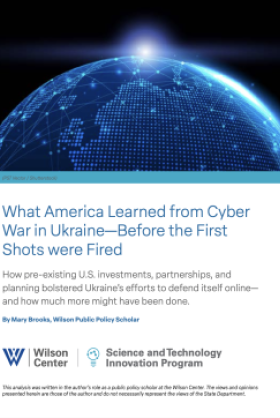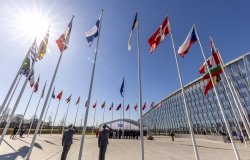Culture Matters
In this Point of View column, the Kennan Institute's Margaret Paxson discusses the impact of culture on politics at all levels and in building community. "When we come together in admiration of the arts of peoples from around the world, we make real strides toward mutual understanding..."
When the Soviet Union fell in 1991, the world saw—as if for the first time—a vast continent, rich in its own history and replete with geographical, linguistic, political, and cultural diversity. This was a territory of more than 114 languages, 100 recognized ethnic groups, and of faith communities representing several of the world's great religions.
From the mountain-dwelling herders of Dagestan, to the nomads of the Mongolian steppe, to the fishermen of Sakhalin Island, to Russian farmers on the cold, cracked lands of the north, the territory spanning what was once the Soviet Union is, the world learned, a panoply of cultures, nationalities, and deeply wrought historical identities.
It is now common to acknowledge that culture is something to be celebrated and appreciated. Indeed, when we come together in admiration of the arts of peoples from around the world, we make real strides toward mutual understanding.
But, at the same time, the cultural tapestry so plainly evident in the peoples and states of the region that emerged from the Soviet Union is much more than an aesthetic reality. A profoundly diverse arena, it bears implications for the political, economic, cultural, and social spheres. Culture, as anthropology tells us, is not merely a set of simple mores and habits-it lies at the foundation of people's beliefs and values, their most deeply held principles, and their most emotional and intimate affiliations.
In that sense, matters of culture also grapple with some of the most profound issues on the world stage today. Do we understand what causes wars or the emotions behind nationalist movements? Do we understand how trust can be established where there has been only suspicion? For the policymaker, failure to heed the lessons of culture can lead to vast errors in judgment that cannot be afforded in these volatile times. Such errors are easy to make if we choose to see this region more like its gray Cold War caricature rather than its vibrant modern reality.
For the past several years, Kennan Institute workshops, lectures, and formal and informal gatherings of scholars, have brought together people whose work is immersed in local matters. Though the Kennan Institute encourages and supports the more traditional studies of high politics and macroeconomics, it has become an important place for studying the region with other instruments—ones that lead to more subtle, shaded, and ultimately more penetrating answers to the daunting issues facing the U.S. policy community today.
Related Program

Kennan Institute
The Kennan Institute is the premier US center for advanced research on Russia and Eurasia and the oldest and largest regional program at the Woodrow Wilson International Center for Scholars. The Kennan Institute is committed to improving American understanding of Russia, Ukraine, Central Asia, the Caucasus, and the surrounding region though research and exchange. Read more










